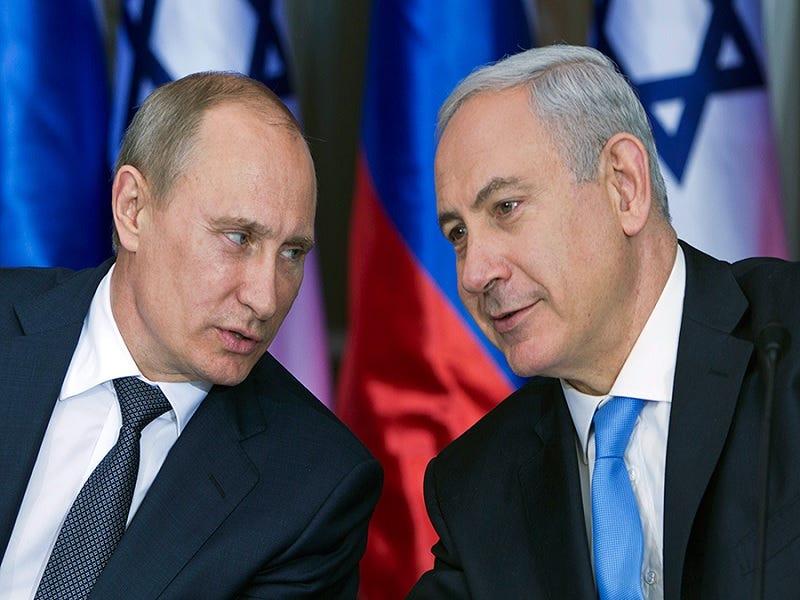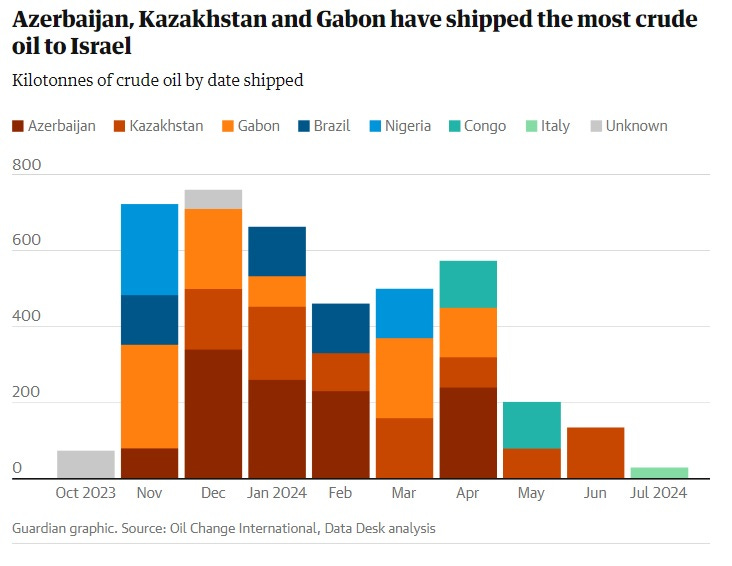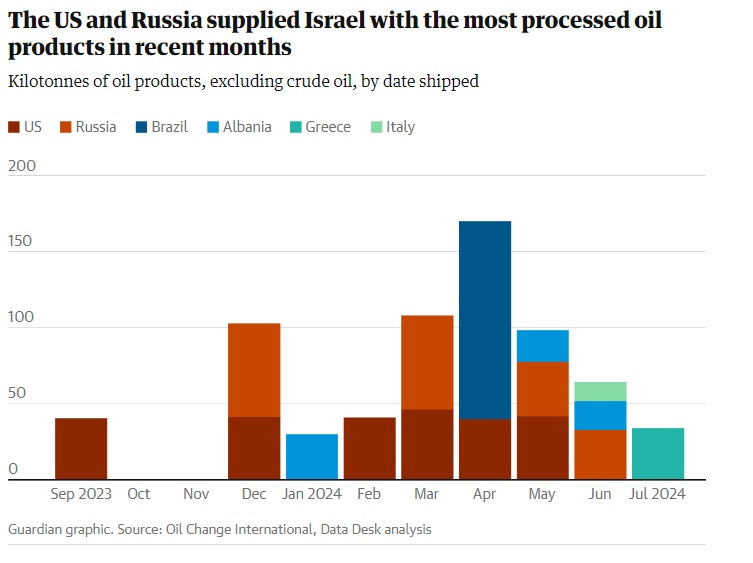It’s important for the public to be more aware of this since it helps explain Russian and Israeli policies towards one another in the context of the Ukrainian Conflict and the regional Israeli-Resistance War.
There’s been grassroots pressure on Turkiye to cut off Azerbaijan’s oil exports to Israel via the Baku-Tbilisi-Ceyhan pipeline ever since what can now be described as the regional Israeli-Resistance War broke out one year ago. Activists believe that this trade literally fuels Israel’s war machine and thus makes all the involved parties indirectly complicit in its alleged war crimes. Regardless of whatever one thinks about this claim, what’s interesting is that there’s no such pressure upon Russia.
The Guardian cited a report from the UK-based Data Desk, which is a tech consultancy firm investigating the fossil fuel industry, to make the following claims in March:
“* The data also suggests that at least 600kt of Kazakh/Russian crude oil has been sent to Israel via the Caspian Pipeline Consortium (CPC) pipeline since October 2023. CPC oil is a blend from major offshore oil fields in the Caspian Sea, as well as smaller onshore fields in southern Russia.
* Chevron has the largest stake among international oil majors in the CPC, followed by ExxonMobil and Shell. These fossil fuel companies also partly own the oilfields feeding the pipeline. The majority of the CPC supply is produced in Kazakhstan and has not been sanctioned, unlike Russia’s crude.
* Russia appears to have also continued regular shipments of vacuum gas oil (VGO), a low-grade fuel oil mostly upgraded into jet fuel and diesel via hydrocracking. Russian VGO is shipped from ports in the Black Sea.
* The data also suggests that four shipments carrying more than 120kt of VGO departed Russia for Israel after the ICJ ordered Israel to take all possible measures to prevent genocide. The flow of Russian VGO has been severely affected by a European Union ban that came into force in February 2023.”
They then followed up on this in August when citing a report from the non-profit Oil Change International, which was exclusively shared with The Guardian, to share the following two graphs:
As can clearly be seen, Russia sells processed oil products to Israel and facilitates Kazakh oil exports to it through the Caspian Pipeline Consortium, yet few paid much attention to The Guardian’s reports. The reason is because the Mainstream Media (MSM) considers Israel to be the ultimate good and Russia to be the ultimate bad while the Alt-Media Community (AMC) reverses their roles. Neither therefore wants to talk too much about their continued energy ties since it goes against their respective narratives.
Nevertheless, it’s important for the public to be more aware of this since it helps explain Russian and Israeli policies towards one another, which are often misportrayed by those two media camps. Israel hasn’t sanctioned Russia for its special operation nor has it armed Ukraine, while Russia hasn’t sanctioned Israel for its campaigns in Gaza and now Lebanon nor has it even symbolically designated it as an “unfriendly country”. These policies respectively upset the MSM and the AMC.
Israel’s can be explained by its reluctance to anger Russia and thus risk creating difficulties for its air force in Syria, which has been allowed to bomb Resistance targets there without direct or indirect interference from Russia (such as electronic jamming or letting Syria use the S-300s) for years already. Likewise, Russia’s can be explained by its reluctance to anger Israel and thus risk it passing along high-tech military equipment (including defensive systems) to Ukraine, which Israel hasn’t yet done.
Having clarified that, it can also no longer be denied that their mutual energy interests play a role in their calculations as well, especially given the present importance of this cooperation for both of them. Israel requires reliable imports of processed oil products and crude given the Houthis’ blockade of the Red Sea, while Russia requires reliable budgetary revenue from resource sales given the Western sanctions. Neither Israel’s US partner nor Russia’s Resistance ones could stop them from cooperating in this way.
Moreover, even in the event that Israel decided to sanction Russia and arm Ukraine, it’s very unlikely that Russia would cut Israel off from its processed oil products and Kazakhstan’s crude. To this day, Russia still supplies energy to the EU in spite of that bloc sanctioning it and arming Ukraine, all because it wants to present itself as a reliable partner in the eyes of the world and also because it require the budgetary revenue. The precedent therefore exists for continuing this trade with Israel in a similar such scenario.
Russia believes that the energy trade should never be politicized, and it’s spoken out against Western pressure on China and India for their large-scale purchase of its oil since 2022. The West claims that those two are financially fueling Russia’s war machine and are thus indirectly complicit in its alleged war crimes, which is similar to what activists claim about Azerbaijan, Georgia, and Turkiye, who they accuse of literally fueling Israel’s war machine and thus being indirectly complicit in its alleged war crimes too.
Accordingly, seeing as how Russia rejects Western claims of China and India being indirectly complicit in its alleged war crimes (which it always denies have taken place) just for purchasing its oil, it would also reject activists’ similar such claims against itself for literally fueling Israel’s war machine. The takeaway is that Russia will remain impervious to any such pressure upon it to cut Israel off from its processed oil products and Kazakhstan’s crude, whether this comes from activists, the West, or the Resistance.







Business is Business, war is war. If Israel keeps up their war on their neighbours, they won't have a functioning economy for much longer and Russia will have to look for a new market.
The Guardian is great at highlighting the little known facts of international business which it chooses to focus on to suit its narrative yet as a typical MI6/I5 mouthpiece, it draws the line when it comes to reporting on his majesty's complex international trade shenanigans.
(1) If so, then Americans can continue to sell weapons to Israel for free or below cost? I see Russia should stand neutral in Caspian Sea shipping and pipelining of Kazakhstan products, at least in exchange for its own NSTC usage of the Caspian Sea. (2) Russia's concern for Israel interference in Ukraine is understandable, but perhaps a bit over-estimating Israel's ability to interfere. The larger risk is dual citizens inside Russia. These people, over-time, could develop something like AIPAC to influence Russian domestic politics, if not yet so. After all, Russia does have a central bank. (3) I think Russia needs to provide more air defense weapons to the ME, starting from Iran. But perhaps to include Saudis Arabia and Iraq in the future -- in exchange of gold or oil, such commodities can be resold easily. (4) In the short term, At least Russia should refrain from exporting products ready to use, such as diesel, gasoline, or jet fuel to Israel. Raw materials for Israel to refine domestically is fine. (5) De-dollarization would never work without KSA participating to a significant extent. While KSA is not pro-Russia, KSA is certainly not pro-Israel.